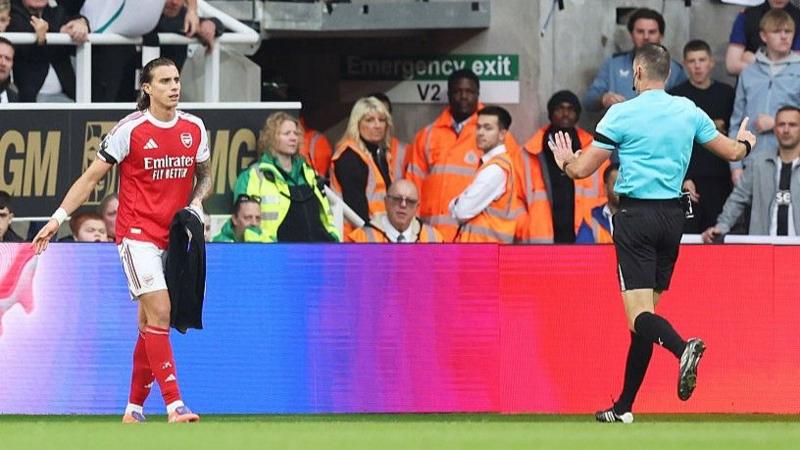Revealed: Shock Reason Behind Calafiori's Towel Ban for Throw-Ins!




In an incident that sparked minor controversy during a Premier League clash between Arsenal and Newcastle United, Riccardo Calafiori was told to refrain from using a towel to dry the football before a throw-in. Here's a breakdown of why this seemingly mundane act became a talking point.
On the surface, using a towel to dry a ball might seem trivial, but in football, even the smallest advantages can be crucial. Throw-ins, typically, are just another method to restart play, but they can be transformed into significant offensive opportunities with the right technique and conditions.
The core of the controversy lies in the rules regarding equipment that can be employed during games. According to the Laws of the Game, as prescribed by the International Football Association Board (IFAB), players are prohibited from using any equipment not deemed essential by the referee. This includes external objects like towels unless specifically authorized by the game's official.
During the game at Arsenal's home ground, the Emirates Stadium, Calafiori was seen attempting to dry the ball with a towel before a throw-in. The intention was clear: a dryer ball is easier to grip and can be thrown more accurately and with greater distance. In wet conditions, this could provide a team with a significant edge when launching the ball back into play, particularly towards the opponent’s goal area.
The referee, adhering strictly to the rules, intervened and prevented Calafiori from using the towel. This decision was likely guided by the need to maintain a level playing field — literally and figuratively. No prior agreement was made about the use of towels, and as such, using one could be deemed as providing an unfair advantage.
Such an intervention isn't new in football circles. Similar incidents have occurred in the past where players, in the heat of the moment, look for any edge they can find, even if it's as simple as drying off the ball. For players from leagues like the Serie A, where Calafiori was signed from Roma, using a towel is quite common and generally accepted. However, the customs and regulations in the Premier League are different, and adherence to these norms is expected, regardless of a player's background or intentions.
The response to the referee's enforcement of this rule has been mixed. Some fans and commentators argue that preventing a player from simply drying the ball seems excessively strict and contrary to the spirit of the game, which should aim to facilitate skillful and fair play. Others commend the officials for their vigilance in maintaining the integrity of the rules, asserting that even small allowances could lead down a slippery slope of rule bending.
Interestingly, this incident illuminates larger critiques and discussions about the state of refereeing in football. Each decision a referee makes can influence the flow and outcome of the game, and their judgment is under constant scrutiny. In this context, the call against Calafiori is a reminder of how challenging the role of a referee can be, straddling the fine line between maintaining order and fostering an engaging, fluid match.
As for Arsenal and Calafiori, such incidents serve as learning moments. For Calafiori, it's an adaptation to the rules and customs of a new footballing environment in the Premier League. For the league, every such occurrence is an opportunity to assess whether the rules serve the spirit of the game or if adjustments are necessary to preserve fairness while enhancing the quality of play.
Despite the momentary disruption, the match continued without further incident related to equipment use, but the debate over such rules and their enforcement is likely to persist as long as football remains a game where every small advantage is pursued relentlessly by its competitors.